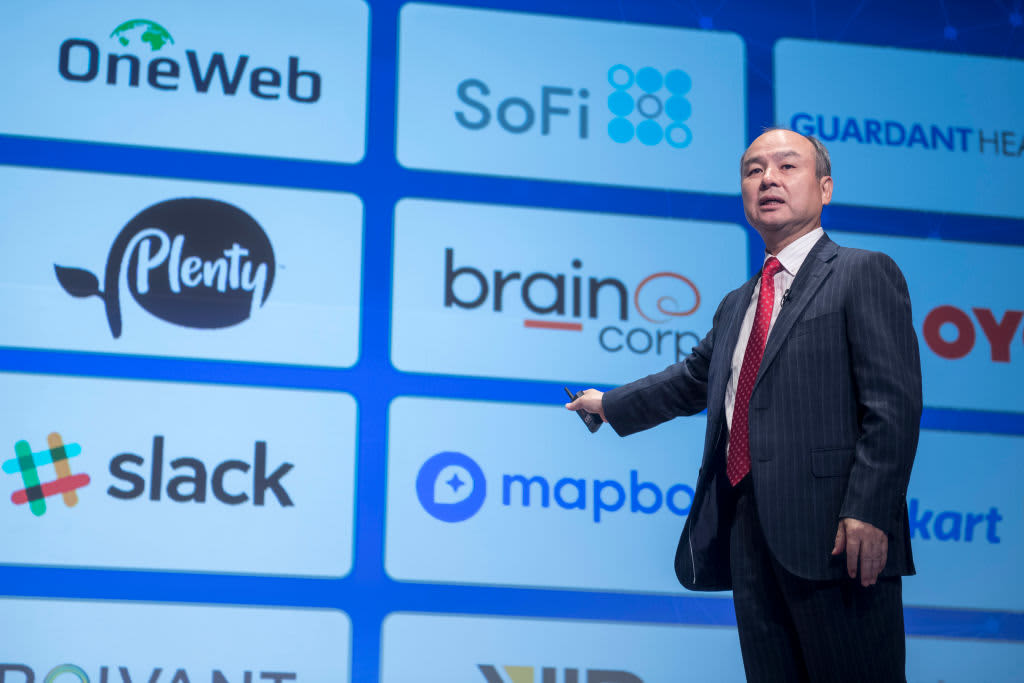SoftBank Group Corp Chairman and CEO Masayoshi Son attends a news conference in Tokyo, Japan, February 8, 2017.
Alessandro Di Ciommo | NurPhoto | Getty Images
SoftBank CEO Masayoshi Son is considering changing his Vision Fund investment strategy to concentrate on companies with clearer pathways to profitability and public offerings, according to people familiar with the matter.
Son plans to slow the pace of investment for Vision Fund 2 compared with his first $100 billion Vision Fund, which has deployed about $80 billion in less than three years. He will target companies that can achieve profitability more quickly, said the people, who asked not to be named because the discussions are private.
The change is driven by the market’s response to past Vision Fund investments. The failure of WeWork to go public, combined with the lackluster performances of other SoftBank investments, such as Uber and Slack, has put the Vision Fund under a microscope as it attempts to raise billions more for a second fund. SoftBank, in conjunction with the Vision Fund, has invested about $10.6 billion in WeWork.
Son plans to take an even more active role with the selection of new investments as scrutiny on Vision Fund 2 intensifies, said the people. However, his shift in focus should be viewed as temporary and could shift if market conditions change, two of the people said.
A SoftBank Vision Fund spokesman declined to comment.
Longer investment period, evergreen component
With almost 85% of its $100 billion spent, Vision Fund 1 is nearly closed to new investments. The fund is keeping about 15% of its capital in reserve for follow-on investments to its existing portfolio companies. The Vision Fund ended the second quarter with 81 investments.
The stated focus for the second Vision Fund remains unchanged: “to facilitate the continued acceleration of the artificial intelligence revolution through investment in market-leading, tech-enabled growth companies.”
The challenge will be finding companies within these sectors that have clear profitability paths. Many venture capital-backed technology companies that have taken hundreds of millions, if not billions, of dollars in funding from SoftBank need the money because they’re not profitable and won’t be for years.
The size of the second Vision Fund is also in flux. Abu Dhabi state fund Mubadala Investment Co. invested $15 billion in Vision Fund 1. It hasn’t decided if it will participate in the second Vision Fund, Ibrahim Ajami, the fund’s head of ventures, said at a Bloomberg conference this week.
The structure of the second Vision Fund will also differ from the first, giving Son more time and flexibility around monetizing investments. While it took about 2½ years to deploy the $80 billion of Vision Fund 1, Vision Fund 2’s target will be to deploy its funding in four to five years, Vision Fund CFO Navneet Govil said at a private investor presentation in Tokyo earlier this year, CNBC has learned.
SoftBank is also discussing a so-called evergreen component to its second Vision Fund. Limited partners may have the option to recycle a certain percentage of their profits from exits back into the fund if they want to continue investing. The fund won’t be a traditional evergreen fund and will provide returns directly to limited partners, two of the people said. No details about Vision Fund 2 have been finalized, the people said.
Managing partners continue to be busy scouting deals with the new guidelines from Son, said the people. While some companies balked at taking money from the Vision Fund last year after Jamal Khashoggi’s slaying at the Saudi consulate in Istanbul last year, those concerns have ebbed in recent months, said the people. Saudi Arabia’s sovereign wealth fund invested $45 billion of Vision Fund 1’s $100 billion, but its role in Vision Fund 2 is still unclear.
As for SoftBank itself, the company said in July it will invest $38 billion in Vision Fund 2, up from the $25 billion it invested in Vision Fund 1. In a filing with the Tokyo Stock Exchange, SoftBank listed Apple, Microsoft, Foxconn, Mizuho Bank, Standard Chartered Bank and the Kazakhstan sovereign wealth fund among other expected LPs.
While Son’s move toward companies with quicker runways to profitability will be the near-term guiding strategy for investment, the SoftBank billionaire prides himself on being nimble and changing with the environment, one of the people said. If market conditions change, Son could change his strategy again, said the person.
–CNBC’s Christina Farr contributed to this story.
WATCH: SoftBank’s Masayoshi Son is ’embarrassed’ by record: Reports
